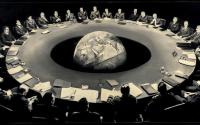Common Dreams / Published on Saturday, August 27, 2005 by the Guardian (UK)
Less than three weeks before world leaders are due to meet in New York for an unprecedented summit aimed at reforming the United Nations and preparing it to face the challenges of the 21st century more effectively, Washington has suddenly proposed hundreds of amendments to the working document. In effect they are telling officials to tear it up and start again. The amendments begin ominously on page one of the 40-page document where, among a list of core values such as freedom, equality and the rule of law, the US - in a none-too-subtle snipe at the Kyoto protocols - wants to delete "respect for nature". The amendments continue in a similar vein over the remaining pages, weakening references to the millennium development goals (agreed by 191 members of the UN five years ago as a strategy to combat poverty), deleting a statement that force should be a "last resort" when dealing with security threats, and so on.
What these amendments actually say comes as no great surprise. We have already heard them from the Bush administration many times, but they are also a sign that hopes for a less divisive approach from Washington during the president's second term may be misplaced. The forum in which this is happening is also significant. Mr Bush has never really forgiven secretary general Kofi Annan and other senior UN figures for their failure to support his invasion of Iraq. Although no one disputes that the UN is in need of reform, the American notion of reform looks more like a settling of scores than an attempt to improve its workings.
The president's controversial appointment of John Bolton as his ambassador at the UN - during a recess without the senate's approval - is a case in point. The abrasive Mr Bolton once famously remarked before his appointment: "There is no such thing as the United Nations. There is only the international community, which can only be led by the only remaining superpower, which is the United States." He also observed that the UN headquarters building in New York has 38 stories and that "if it lost 10 stories, it wouldn't make a bit of difference".
Mr Bolton is described by some as a multilateralist - though he seems to favor the kind of multilateralism where the US occupies the driving seat, such as NATO and the "coalition of the willing" in Iraq. At the same time he has opposed other international initiatives that might impose constraints on the US, including the international criminal court and treaties restricting landmines, biological weapons, nuclear weapons testing and the small arms trade.
He was reportedly disappointed that President Bush did not include Cuba in the axis of evil along with Iraq, Iran and North Korea. While working at the state department under Colin Powell, he described President Kim Jong Il as a tyrannical dictator - which, true though it may be, is not the sort of language to yield productive results in the world of international diplomacy. North Korea responded in kind by calling Mr Bolton "human scum" and a "bloodsucker".
This confrontational style goes down well with the American neoconservatives who, little more than two years ago, were arguing that a dose of "creative destruction" in Iraq would work wonders for the Middle East and apparently hope to try the same remedy at the UN now.
It is difficult to see, though, how this can be squared with the efforts of Condoleezza Rice who, since she took over as secretary of state, has been trying to repair diplomatic damage caused by the Iraq war, or the appointment of former White House counselor Karen Hughes to improve America's faded image abroad. While Ms Rice is busy building bridges, Mr Bolton seems equally busy blowing them up.






